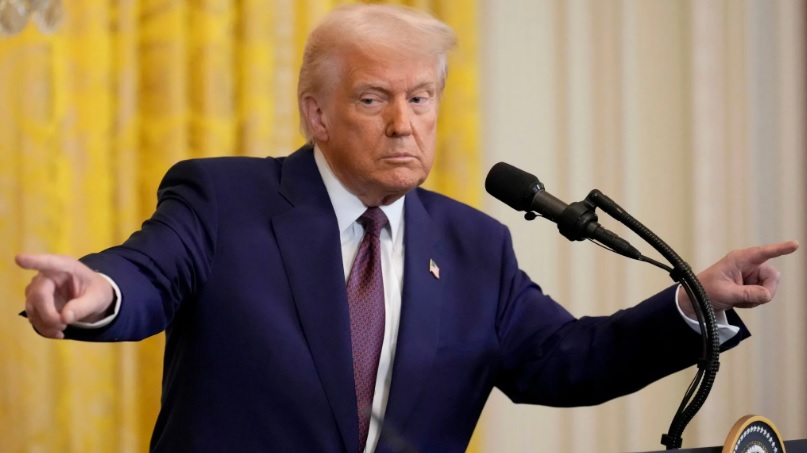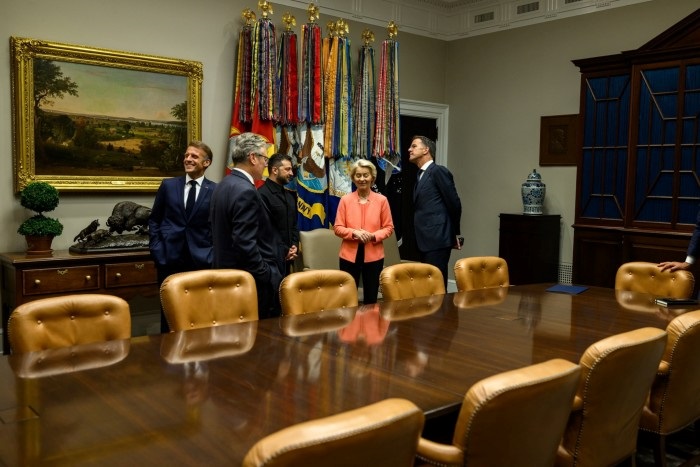 Is Trump fickle?
Is Trump fickle?
Photo: AP
President Donald Trump’s tone on Ukraine has softened dramatically in recent weeks, from tough talk aimed to pressure Russian President Vladimir Putin last month to a more hands-off approach, FOX News notes.
After signaling strong support for Ukraine and pledging to bring an end to Russia’s invasion, Trump now appears far less committed to aiding Kyiv or forcing a resolution to the war.
The reversal began quietly two weeks ago when Ukrainian Zelenskyy visited Washington. Many had expected Trump to approve Tomahawk long-range missiles for Ukraine — but he didn’t.
The president said it would take too long to train on the missile system and that the U.S. needed them for its own stockpile. He vociferously denied a Wall Street Journal report suggesting the U.S. had lifted restrictions on Ukraine's use of long-range missiles to fire into Russia.
Then came Thursday’s announcement from the Department of War that a rotational U.S. Army brigade stationed in Romania, with forces also in Hungary and Bulgaria, would be coming home. Trump dismissed the pullback as "not very significant, not a big deal," though European allies saw it differently.
"This will be an invitation for Russia to increase their attacks on Ukraine, increase its influence in the region," one European official told Fox News Digital.
The softer posture extended to Trump’s meeting with Chinese President Xi Jinping on Thursday. Despite previously pressing India to curb its purchases of Russian oil, Trump made no such demand of Xi.
"We really didn’t discuss the oil," he told reporters afterward.
Ending the war did come up, but in a noticeably less urgent tone.
"We’re both going to work together to see if we can get something done," Trump said. "We agree that the sides are locked in, fighting, and sometimes you have to let them fight, I guess. Crazy. But he’s going to help us and we’re going to work together on Ukraine."
At the same time, Trump announced the U.S. would resume nuclear weapons testing for the first time since 1992, blaming "other countries’ testing programs."
Russia claims it recently tested a nuclear-powered drone along with a nuclear-capable missile and submarine, but the tests did not involve a detonation. Russia has not confirmed a nuclear weapon test since 1990.
Even as Trump insists his administration is pursuing peace "through strength," his latest actions and rhetoric paint a more complicated picture — one that has left allies guessing which version of Trump’s Ukraine policy will prevail next.
 A revealing scene. Trump's priorities are set. France’s Emmanuel Macron, Britain’s Keir Starmer, Ukraine’s Volodymyr Zelenskyy, the European Commission’s Ursula von der Leyen, and NATO’s Mark Rutte wait while the US president has a phone call with Vladimir Putin.
A revealing scene. Trump's priorities are set. France’s Emmanuel Macron, Britain’s Keir Starmer, Ukraine’s Volodymyr Zelenskyy, the European Commission’s Ursula von der Leyen, and NATO’s Mark Rutte wait while the US president has a phone call with Vladimir Putin.
Photo: White House
Trump’s sudden changes of direction can make his foreign policy seem bewilderingly unpredictable. But there are some clear themes that have emerged over the past nine months, ‘Financial Times’ notes.
The president has certain unwavering obsessions. He loves tariffs — believing that they will make America richer and more powerful. He is also convinced that the US has been “ripped off” by its allies and is determined to remake the international system to align with his “America First” policy.
Trump’s approach to world affairs is deeply transactional. Talk about American values and freedom — beloved of former presidents — has been dropped. Instead, Trump likes to talk about American strength and to pocket “wins”. Those victories could be the promise of huge investments into the US. Or they could be another peace settlement that he can take credit for.
The president’s desire to be a peacemaker seems to be genuine enough. It may reflect a genuine horror of warfare. It could be driven by an urge to match the Nobel Peace Prize that was (bafflingly) awarded to Barack Obama in 2009.
To Give War a Chance
But Trump has also — on occasion — been prepared to give war a chance. In June, after Israel attacked Iran’s nuclear facilities, he authorised American participation in follow-on air strikes on Iran. This was a step that had been contemplated — and rejected — by successive US presidents over the previous 20 years. In the aftermath of the strikes, Trump was quick to claim credit for “obliterating” Iran’s nuclear facilities. Doubters within the administration were quickly silenced.
Even as he rejoices in presiding over another peace deal — this time between Thailand and Cambodia — Trump is pivoting to the use of force in the Caribbean. In recent weeks, the US has carried out a series of deadly strikes against boats that were alleged to be carrying drugs. The aircraft carrier USS Gerald R Ford has just been dispatched to the region — and there is talk of an effort to force regime change in Venezuela.
Trump’s apparent desire for a grand bargain with Xi has disrupted one of the few areas of US foreign policy where a bipartisan consensus had emerged.
The Biden administration called China “the pacing threat” for the US and sought to rally American allies in an effort to contain Beijing’s power.
The second Trump administration seemed poised to continue this effort. It was widely anticipated that Trump’s tariffs would focus on China above all — aligning his economic instincts with the broader strategic effort to contain Chinese power.
But the tariffs that Trump has imposed on key Asian allies and friends — such as Japan, India, Taiwan and South Korea — have run counter to efforts to isolate China within Asia. Countries such as India and Vietnam are now trying to get closer to Beijing.
So what is the world to make of all these conflicting initiatives and policies? Will the history books one day discern a coherent “Trump doctrine” to stand alongside the “Truman doctrine” that was put in place at the beginning of the cold war?
The Imperialism. Trump’s style
One campaign that almost nobody anticipated was the early statement of a new form of American imperialism — manifested in the president’s stated desire to annex Greenland and his repeated suggestions that Canada should become the 51st state. This was strong stuff — even for the primacists — and there is still some dispute about who put these ideas on Trump’s agenda.
Overt imperialism is being played down for now — although there may be ongoing covert efforts to further Trump’s ambitions in Greenland. But threatening Canada and Denmark, insulting India and Brazil, imposing tariffs on all America’s allies and encouraging the far right in Europe, may still have a long-term cost.
As Jeremy Shapiro of the European Council on Foreign Relations puts it, “Trump is trading short-term victories for long-term problems. He is spending down 80 years of American diplomatic capital”. That capital was accumulated, in large part, by underpinning the global trading system and by underwriting the security of America’s allies in Asia and Europe.
That has made countries such as Japan, Britain, Canada and many others highly dependent on the US — which gives America enormous leverage. But by using that leverage in a startlingly ruthless fashion, Trump is also sending out a message for the future — rely on America at your peril.
The almost inevitable consequence is that America’s allies will begin to hedge against US power.
Countries that are not US allies — and that do not rely on an American security guarantee — are even freer to respond robustly to perceived bullying from the Trump White House. Brazil’s President Luiz Inácio Lula da Silva pushed back hard against efforts from the Trump administration to prevent the prosecution and potential imprisonment of former president Jair Bolsonaro, a key Trump ally. Narendra Modi, the Indian prime minister, reportedly refused to take phone calls from Trump in the aftermath of the India-US row.
As a result, America is losing influence with key players across the global south. In a recent article for Foreign Affairs, Richard Fontaine and Gibbs McKinley complain that America is alienating the swing states in the global system and argue that “Washington is driving the Brics to become an anti-American bloc”.
read more in our Telegram-channel https://t.me/The_International_Affairs

 11:41 10.11.2025 •
11:41 10.11.2025 •






















